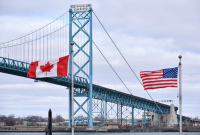Support strong Canadian climate journalism for 2025
Inside the Peace Arch that marks the international border between British Columbia and Washington is the inscription “may these gates never be closed.” These days, the reality is a bit more complicated.
The gates to the Canada-U.S. land border, at least metaphorically, have been closed to all non-essential traffic since March 21, due to the coronavirus pandemic.
Essential workers and commercial traffic have been allowed to cross, but no recreation or tourism is permitted. Last week, those rules were extended again until July 21.
Despite the frustration felt by sectors such as tourism and companies such as airlines, Prime Minister Justin Trudeau said Monday that the health of Canadians must remain everyone’s primary concern.
“We know that reopening too quickly or carelessly would lead us to a resurgence (of the virus) that might well force us to go back into lockdown,” he said during his daily address.
Chief Public Health Officer Dr. Theresa Tam has also sounded a note of caution, as COVID-19 cases continue to climb in the U.S. The country has recently been reporting about 20,000 new cases per day nationwide, compared to 284 new cases in Canada on Monday.
“If the numbers keep going up that’s going to definitely inform what might happen next at the border,” Tam said.
Even so, the spirit of that Peace Arch inscription has stayed alive.
Friends, family and couples had reportedly been gathering in the shared park that surrounds the Peace Arch between Blaine, Wash., and Surrey, B.C., where visitors had been free to roam as long as they didn't cross the border.
For roughly a month between May 14, when the Canadian side of the park reopened, and June 18, when BC Parks decided to close it again, parking lots and local access roads became “overwhelmed” with vehicle traffic, and a “dramatic increase in visitation,” the agency said.
There were reports of multiple couples tying the knot. BC Parks said attendance doubled compared to the same period last year.
Earlier this month, however, the Trudeau government eased up a bit on border restrictions, allowing foreigners who are immediate family members of Canadian citizens and permanent residents, and who don’t have COVID-19 symptoms, to be allowed to enter the country.
They must, however, quarantine for 14 days upon arrival, which means their stay in Canada has to be at least 15 days long.
But BC Parks is still facing pressure to reopen the park. Abbotsford woman Megan Ferguson’s petition, which asks for a reopening with some safety precautions, had garnered about 1,300 signatures by Tuesday afternoon.
On the petition are dozens of people describing how the park was their only way to see loved ones.
National Observer asked B.C.'s Ministry of Environment and Climate Change Strategy if it was considering a reopening using COVID-19 precautions such as temperature checks.
The ministry responded that it understands the importance of family and friends reuniting, but the visitor increase had become “unmanageable.”
“BC Parks consulted with local communities, the RCMP and our counterparts in Washington State and had taken a series of measures to manage visitor growth, but those measures did not address the risk associated with the significant increase in visitation,” a spokesperson said.
“It’s important to remember that the closure is temporary, and the park will reopen as soon as it is safe to do so.”
Border park nuptials are not the only quirk about the Canada-U.S. land border that has come about from COVID-19 restrictions.
The Canada Border Services Agency has said 7,639 foreign nationals were turned away from Canada between March 22 and June 16, a number that included 6,615 U.S. citizens.
Some Americans are still permitted to drive across the border, if they're headed to Alaska to go home or to go to work, which would make those essential trips.
But the RCMP in Alberta said they handed out seven tickets to Americans in Banff National Park. The police say Americans travelling in Canada to Alaska must take a direct route and stay away from people when they stop for food or rest.
RCMP Cpl. Deanna Fontaine told CBC News that six of the seven tickets of $1,200 each were connected to Americans who had gone hiking.
The police force says it has received other complaints about U.S. licence plates in the area, although some of these vehicles could have already been in Canada before the border restrictions.
Carl Meyer / Local Journalism Initiative / Canada's National Observer






Comments
This activity should not have been allowed in the first place. America, by definition, is a horror show. Americans (and perhaps their close family friends from Canada) generally do not appear willing to follow rules unless forced. So, let them stay home. Period. As for those in Canada who are now whining, you had a chance to show you could be adults. You blew it. Take your petition and save it for the next shortage of toilet paper.